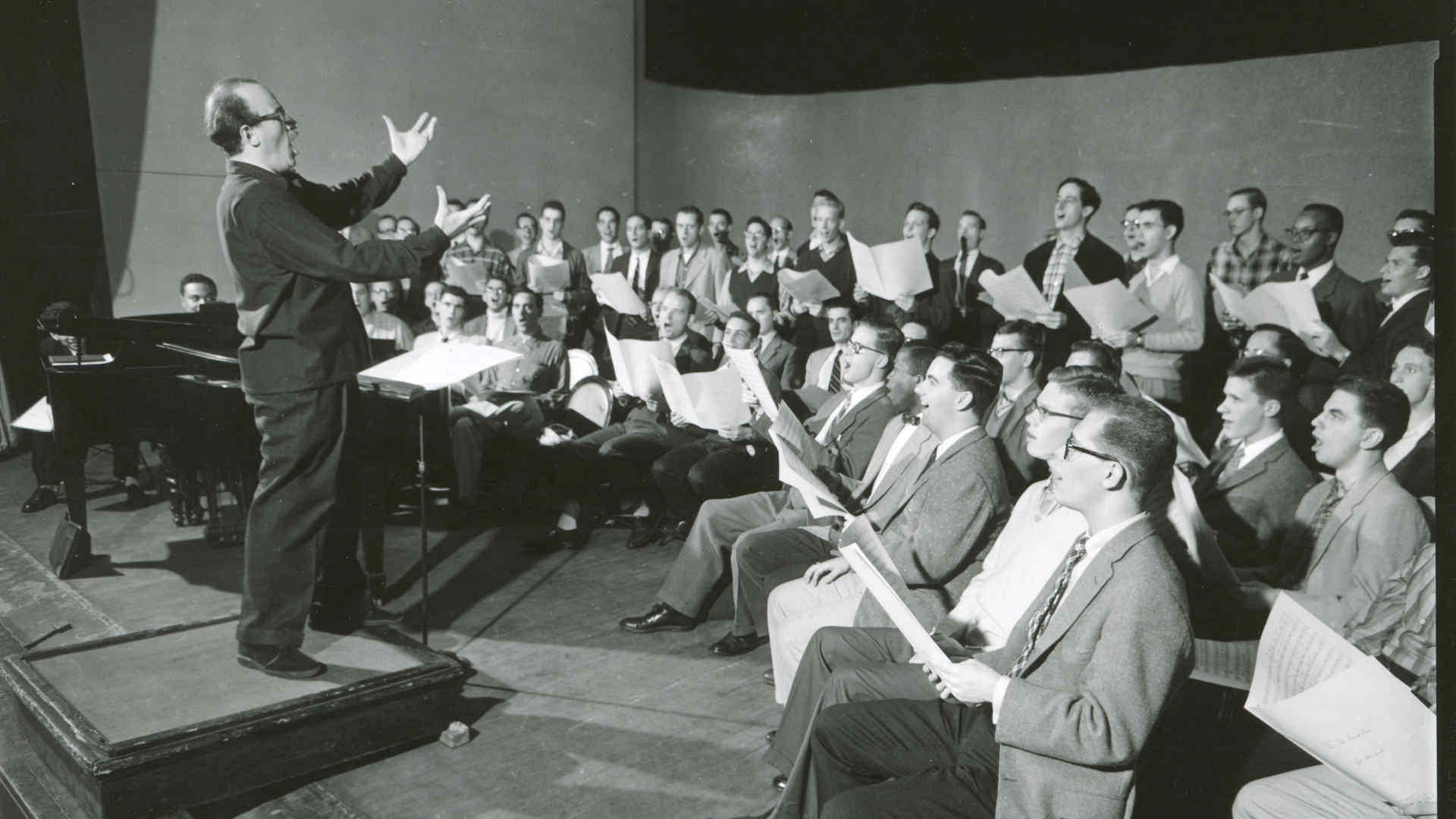
In spring 2020, the Journal published reminiscences from alums in advance of a Music Division reunion that was postponed because of the pandemic.
Alum H. Wendell Howard responded with a typed letter sharing some reminiscences of his own; unfortunately, due to mail issues and the office being closed, we didn't see the letter for a few months and learned very shortly after we did that he died. Howard served for many years as chair of the English department and director of the Glee Club at St. John Fisher College in Rochester.
At age 93, I have trouble remembering what key Bach’s Fugue in D Minor is in, but “Music Alums Reminisce” in the Spring Journal triggered scores of clear memories.
Before the reminiscences, though, notice of Lynn Harrell’s (Pre-College ’61, cello; faculty 1977-86) death made me recall the one occasion when I was face to face with his father, Mack Harrell (Juilliard Graduate School ’37; faculty 1945-57). I was finishing my Korean War tour of duty, and Juilliard had set a special audition to accommodate my Army restraints. After I rendered (an apt term to be sure) a Mozart aria that I no longer recall, a voice from the assembled persons that circled the room spoke, “You have indicated on your application that you wish to train with Mr. Harrell.” (That was because Mack Harrell was the only name on the list of voice faculty that I knew.) Then, “Mr. Harrell, will you accept him as your student?” Without hesitation, another voice replied, “I wouldn’t touch him with a 10-foot pole.” Out of the surprised silence that followed, another voice said, “I’ll take him.” It was Dolf Swing. That far-from-usual audition was the beginning of my four years studying with Swing (faculty 1946-69), whose top-floor studio offered the bonus of an unrestricted view of the comings and goings of a nesting eagle at Riverside Church across the way.
The picture of Rosina Lhévinne (faculty 1925-76) makes me recall a gathering in the cafeteria or lounge that included John Browning (BS ’56, piano; faculty 1986-96). One day he arrived from her studio, fuming. His just-finished lesson had been strenuous, with Madame Lhèvinne emphasizing her points by repeatedly striking John’s upper arm. At the end of that session, she asked, “But John, why do you play so many wrong notes?” Student-teacher protocol, deference, and personal manners had dictated that he expose his fury only to us.
As I look at the picture of Beveridge Webster (faculty 1946-90), the voice of Vincent Persichetti (faculty 1947-90) reverberates with his more-than-once stated declaration, “Beveridge Webster won’t even sit down at a piano if it is not a Baldwin.” Persichetti’s tone, slightly amused, slightly accusatory, hinted that Webster’s preference was a near-obsessive attachment. Those of us in Persichetti’s L&M class smiled, because we saw something of the same fixation in Persichetti’s unwavering insistence that he drive his own car to Manhattan to teach. On those days when he could find no parking place, he would circle the building on Claremont Avenue, and we would go down one by one and hop into the front seat. As he drove around the building, his quick scan of my homework picked out all the parallel fifths, improper voice leadings, and whatever else needed correction. At the same time, he was searching for a parking space and avoiding a traffic collision. One circuit was my allotted time, so back in front the building I got out and the next student got in.
When Stephen Danker recalled Elizabeth Stambler (faculty 1966-69) in the article, my thoughts turned to Bernard Stambler (faculty 1947-72), with whom my wife studied Dante and who several times visited us in our apartment. The autographed copy of his Dante’s Other World sits among my prized collection of autographed volumes. But it was a story that circulated in the cafeteria that did much to establish a popular persona for Stambler. The story said that he had purchased a relatively isolated old farm house in New Jersey where he installed a pipe organ, and he almost always played it at full stop until he had literally shaken the house loose. Periodically, then, he had to enlist students to go with him to nail the house back together. Like most oral histories, this one gathered embellishments in the telling, and soon a kind of eeriness affixed itself to the name Stambler. I never did get around to asking about it because he was so engaging in recounting his conversation with Robert Frost while playing pool, or revealing a few snags he encountered writing the libretto for the opera Pantaloon, or regaling us with accounts of serving as historian for the War Department.
When Madeline Marshall (faculty 1936-86), Juilliard’s teacher of English diction, identified some of my verbal idiosyncrasies as coming from Indiana, she also discovered—more importantly to her, I might add—that one of my fraternity brothers as an undergraduate at an Indiana liberal arts college had been Bill Hayes, who recorded [the top song for much of the spring of 1955]. The English diction maven for Metropolitan Opera stars unabashedly professed to being the “world’s number-one fan” of “The Ballad of Davy Crockett.”
H. Wendell Howard (Diploma ’58, voice)